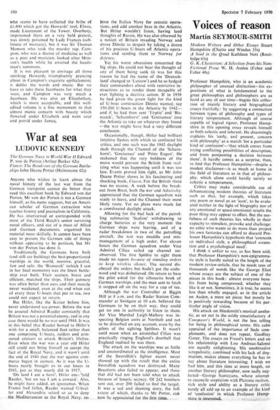War at sea
LUDOVIC KENNEDY
The German Navy in World War II Edward P. von de Porten (Arthur Barker 42s) Fiasco: The Break-out of the German Battle- ships John Deane Potter (Heinemann 42s)
Anyone who wishes to learn about the naval history of the last war from the German viewpoint cannot do better than read this excellent book by Edward von der Porten. Mr von der Porten is not a German himself, as his name suggests, but an Ameril can scholar of German extraction who teaches history and journalism in California. He has interviewed or corresponded with most of the Third Reich's senior surviving naval officers, and out of a mass of Allied and German documents, organised his material most skilfully. It cannot have been easy to present the German side of things without appearing to be partisan, but Mr von der Porten has done it.
Traditionally the Germans have built (and still are building) the best-proportioned warships in the world, massive, graceful, fast and safe: the 'Bismarck' (which I saw. in her final moments) was the finest battle- ship ever built. Their seamen, brave and efficient, matched the ships. Their gunnery was often better than ours and their morale never weakened, even at the end when out of every three U-boats that put to sea, two could not expect to return.
But Hitler, like the Kaiser before him, never understood sea-power. Before the war he assured Admiral Raeder constantly that Britain was not a potential enemy, and in any case there would be no war until 1944. It was in this belief that Raeder bowed to Hitler's wish for a small, balanced fleet rather than one comprising U-boats, raiders and arm- oured cruisers to attack Britain's lifeline. Even when the war was a year old Hitler still could not bring himself to accept the fact of the Royal Navy, and it wasn't until the end of 1940 that the war against com- merce began in earnest. As it was the U- boats nearly brought us to our knees in 1943, just as they nearly did in 1917.
'On land I am a hero', Hitler once 'told Raeder, 'but on sea I am a coward'. Also, he might have added, an ignoramus. When France had fallen, Raeder wanted Gibral- tar and Alexandria seized so as to ' deny the Mediterranean to the Royal Navy, re. lease the Italian Navy for oceanic opera- tions, and add another base in the Atlantic. But Hitler wouldn't listen, having land thoughts of Russia. He was also obsessed by a notion of Britain invading Norway and drove Donitz to despair by taking a dozen of his precious U-boats off Atlantic opera., tions and sending them to Norway for defence.
Yet his worst obsessions concerned the big ships. He could not bear the thought of any of them being sunk (it was for this reason he had the name of the 'Deutsch- land' changed to `Lutzow) and he so hedged their commanders about with restrictive in- structions as to render them incapable of ever fighting a decisive action. If in 1939 he had given the green light for the kind of U-boat construction Donitz wanted, say 150-200 U-boats in the Atlantic by 1942— and if he had then sent `Tirpitz' and 'Bis- marck', `Scharnhorst' and `Gneisenau' into the Atlantic to take on whatever they found —the war might have had a very different conclusion.
Occasionally, though, Hitler had brilliant intuitive flashes with which to confound his critics, and one such was the 1942 daylight dash through the Channel of the `Scharn- horst', `Gneisenau' and 'Prinz Eugen'. He reckoned that the very boldness of the move would prevent the British from real- izing what was happening until it was too late. Events proved him right, as Mr John Deane Potter shows in his fascinating and shocking book, Fiasco. For the British there was no excuse. A week before the break- out from Brest, both the RAF and Admiralty appreciated that the German squadron was ready to leave, and the Channel their most likely route. Yet no plans were made for a coordinated daylight attack.
Allowing for the bad luck of the patrol- ling submarine 'Sealion' withdrawing to charge batteries at the very moment the German ships were leaving, and of a radar breakdown in two of the patrolling aircraft, the rest was muddle and mis- management of a high order. For eleven hours the German squadron under Vice Admiral Ciliax sailed up channel un- observed. The first Spitfire to sight them made no report because of standing orders to keep wireless silence. The second dis- obeyed the orders but hadn't got the code- word and was disbelieved. On return to base the pilot asked for the silhouette book of German warships, and the man sent to fetch it stopped off on the way for a cup of tea.
Although the RAF Controller at Biggin Hill at 8 a.m. and the Radar Station Com- mander at Swingate at 10 a.m. believed the Germans to be on their way, they could get no one in authority to listen to them. Air Vice Marshal Leigh-Mallory was in- specting Belgian units at Northolt and not to be disturbed on any account, even by the pilots of the sighting Spitfires. It wasn't until noon when an astonished Ciliax was practically ringing England's doorbell that England realised he was there.
The attack on the warships was as futile and uncoordinated as the intelligence. Most of the Swordfish's fighter escort never showed up with the result that the entire Swordfish squadron was destroyed. Many Beauforts also failed to appear, and those that did had not been told what to attack because of lunatic secrecy. Of 242 bombers sent out, over 200 failed to find the target. It was a sad and shaming story, the full extent of which, thanks to Mr Potter, can now be appreciated for the first time.


































 Previous page
Previous page